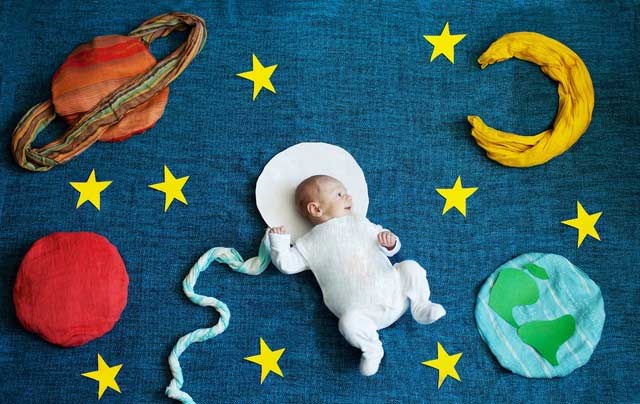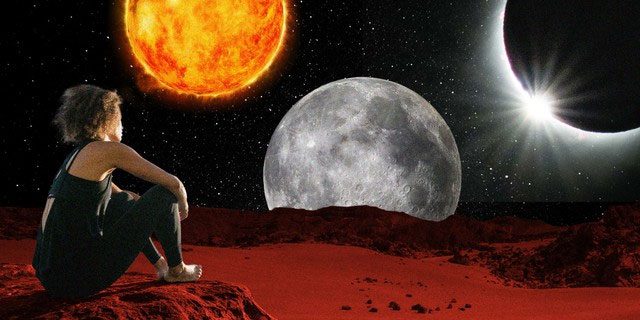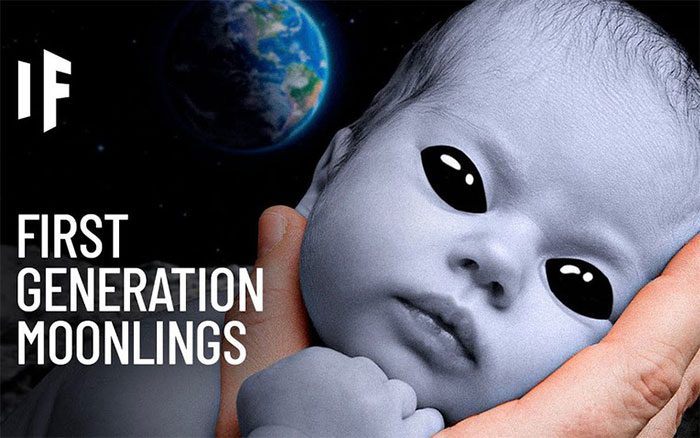Welcome to the future, where children are not only born on Earth but also on the Moon.
This is no longer a distant science fiction tale but a realistic possibility in the near future. But how will being born on the Moon differ from being born on Earth? And if you are one of the first “Moon children,” how will your body and life change? Let’s explore the challenges, adaptations, and differences that children born on the Moon may face.
Starting Life 384,400 km from Earth
If you were born on the Moon, the first thing you would see is a modern base rather than the barren and harsh surface of this satellite. Here, there is no atmosphere to shield you from radiation, daytime temperatures can soar to 120°C, and drop to -130°C at night. However, your life will not begin under such extreme conditions. You will be born in a protected base, equipped with advanced technology and surrounded by a team of astronauts.
Although the gravity on the Moon is only one-sixth that of Earth, this does not provide many advantages for childbirth. Pregnancy on the Moon may last longer than usual, as fetal development occurs at a slower rate. Moreover, in space, your mother may lose 1-2% of bone density each month, making the birthing process more difficult and dangerous compared to being on Earth. To ensure safety, cesarean delivery may become the primary method for babies born on the Moon.

Children born on the Moon may have thinner bones than those on Earth.
Physical Differences Between Moon Children and Earthlings
Children born on the Moon will face several distinct biological changes compared to Earthlings. Lower gravity may cause your bones and muscles to develop differently. Moon children may have thinner bone structures and less muscle mass compared to those on Earth, due to the living environment not requiring significant load-bearing capabilities.
Additionally, your skin color may also evolve to adapt to the new environment. On Earth, melanin in the skin helps protect us from solar radiation. However, since the Moon lacks an atmosphere, children born here may need to develop darker skin to combat radiation. Conversely, if life primarily occurs in enclosed bases or in space suits, the skin of Moon children may be lighter due to a lack of exposure to sunlight.

A greater challenge for those born on the Moon will be their immune system.
The Evolution Potential of a New Species
If, for some reason, Earthlings and those born on the Moon do not meet and intermarry over a long period, biological separation could lead to the formation of a new human species. While this may take hundreds or even thousands of generations, you will be among the first individuals to experience this incredible evolution.
However, a greater challenge for those born on the Moon will be their immune system. Living in a closed environment with limited exposure to Earth pathogens may weaken your immune system. Interacting with Earth visitors could make you more susceptible to infectious diseases, and conversely, you may also introduce new risks to those on Earth when returning.
Challenges When Returning to Earth
If you were born on the Moon and have the opportunity to return to Earth, your body will have to undergo a difficult adjustment process to the higher gravity of Earth. You will need one to two weeks for your body to acclimatize, during which dizziness and imbalance will be uncomfortable experiences. Engaging in simple activities like walking, running, or even standing up quickly may become very challenging.

Light from Earth will illuminate your life on the Moon.
Earth’s Light on the Moon: A Stunning View
However, one special thing that Moon children will enjoy is the stunning view of Earth from the near side of the Moon. Earth reflects about 37% of sunlight, making it 43 times brighter than the Moon when viewed from Earth. The light from Earth will illuminate your life, creating a beautiful sight, but perhaps not suitable for those who prefer to sleep in complete darkness. If this disturbs you, you might consider moving to the far side of the Moon, where darkness always prevails.
The Evolution of Humanity in Space
Being born on the Moon will present you with significant challenges and differences compared to Earthlings. However, this life also opens up new opportunities, marking a step forward in humanity’s journey to conquer space. From adapting to a new living environment to potential biological evolution, you will be among the first to experience a new chapter in human development.
Being born on the Moon is just the beginning. In the future, we may dream of living on other planets, like Mars. But before that, Moon children will be the pioneers, carrying both the hopes and challenges of humanity expanding beyond Earth.


















































